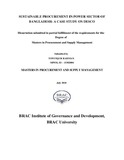| dc.description.abstract | The Public Procurement Act, 2006 is the only established law for procurement in any sector in
Bangladesh. In the Public Procurement Act, 2006 (PPA 2006), the term ‘procurement’ has been
defined as ‘the purchasing or hiring of goods, or acquisition of goods through purchasing and
hiring, and the execution of works and performance of services by any contractual means’. As
power sector of Bangladesh mainly govern by public organizations, so procurement can broadly
be defined as the purchasing, hiring or obtaining of goods, works or services by the power
sector by any contractual means.
The items involved in procurement of DESCO and power sector range from simple goods or
services such as clips or cleaning services to master plan, environmental assessment, large
commercial projects, such as the development of infrastructure, installation of large turbine,
generator, transformer installation, of automation system like SCADA etc., billing software,
operation and maintenance by outsource people etc. The purpose of procurement in the private
sector is basically straightforward whereas that in the public sector complex as considers the
economic development and welfare of the country rather than the commercial profits.
Furthermore, unlike other private procurement, power sector as well as DESCO’s procurement
needs to address the considerations of integrity, accountability, national interest and
effectiveness since power sector deal with common people’s money.
Sustainable Procurement (SP) is procurement that is consistent with the principles of
sustainable development, such as ensuring a strong, healthy and livable society for all, living
within environmental limits and promoting good governance. Sustainable procurement is an
approach that takes economic, environmental and social sustainability into accounts during
making any purchasing decisions.
An analysis through the review of DESCO’s procurement as a subject of case study to find out
the possible scope of sustainable procurement in present power sector procurement framework
reveals that although there are some provisions in the PPR, 2008 and STDs which relate to the
sustainability issues, these are not sufficient in introducing sustainability in the power sector
procurement.
d
The current scenario of sustainable procurement practice in the power sector and DESCO has
been studied through analyzing the Annual Reports, interviews with key procurement
professionals and survey with procurement officers of different power sector organizations
addressing three aspects namely economic, environmental and social aspect of sustainable
procurement. The analyses indicate that although there are a few cases where some sustainability
issues are in practice, these are not very common as a whole in the power sector of Bangladesh.
Existing tendering system in Bangladesh is still based on the lowest price approach and whole
life costing approach is rarely considered in power sector organizations except project
procurement. There are no provision for environmental performance in the power sector
except nuclear power plant and coal based power plant. The study indicates that at present
there is virtually no mechanism in our power sector procurement system to check the
environmental performance of contractors/ suppliers.
Sustainability criteria should be embedded in the tendering system of any organization.
Knowledge and awareness at the individual procurement professional level seem important in
order to make active sustainable procurement choices. A clear commitment is necessary from
the very top of the management which has to be transferred to everyone involves in
procurement or consumption. It is necessary to formulate a sustainable procurement policy and
to align the procurement framework with the policy.
Finally, there is a huge scope to further study about the sustainability issue. Advanced research
needs to be conducted in order to get a deeper insight into the sustainability issue in relation to
DESCO’s procurement as well as the power sector procurement in Bangladesh. | en_US |

